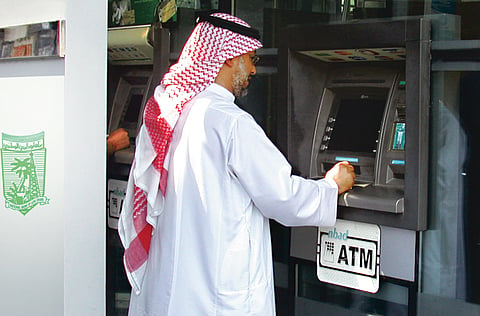Banking on customer relationships
Strong fundamentals and promising income demographics will always make Abu Dhabi an important base for world banks

Having proved resilient to the global financial meltdown owing to strong fundamentals and prudent regulation, Abu Dhabi's banking and financial sector is on an upward growth curve.
"The growth is apparent if one looks at the emphasis that many UAE banks are now putting on Abu Dhabi. We see an increase in the number of branches being opened here recently. To cater to the demand, National Bank of Abu Dhabi (NBAD) has also continued to expand its presence in the emirate and our current branch network in Abu Dhabi is 82," says Suvo Sarkar, General Manager of NBAD's Consumer and Elite Banking Division.
Agrees Sanjoy Sen, Head of Citibank's Consumer Banking — Middle East, Pakistan and North Africa, "We have expanded our ATM network and financial centres keeping in view the tremendous potential in the retail banking space in Abu Dhabi." Citibank, which has been in the UAE since 1964, operates 11 branches and financial centres in Abu Dhabi.
Here, the industry, as a whole, shows comfortable levels of capitalisation and profits. Retail banking in Abu Dhabi is not very different from the other emirates — except perhaps for higher levels of competition. But Sen says that clients in the capital are more relationship-driven and value long-term partnership with a bank.
"Strong fundamentals, high concentration of working population and very promising income demographics make it encouraging for us to do business in the emirate," says Mohammed Al Mazemi, General Manager of Standard Chartered Bank's Branch Sales and Service, UAE, and Head of Consumer Banking, Abu Dhabi and Al Ain. He adds that Standard Chartered is also looking to leverage its ATM network and service centres in an attempt to reinforce its commitment to Abu Dhabi. The bank currently operates two branches in Abu Dhabi and one in Al Ain.
Current trends
Although there has been a slight drop in disposable income of the target segment and hence a reduced interest in long-term financial planning, deleveraging across products is a common phenomenon. "Prudential regulations to limit the risks associated with mortgages and other real estate lending by banks and finance companies would also slow down the financing market," warns Sen.
As the global economy attempts to pick up pace after the horrors of 2008 and 2009, the general trend in personal savings and investments is to opt for solutions that offer lower risks. Accordingly, banks are offering products and services which provide clientsa sense of security.
"Risk aversion is becoming predominant in the UAE in line with global trends. Fixed-income products and traditional bank deposits for capital preservation is becoming very critical in any financial plan. Also the time horizon for investments is reducing compared to what clients chose in the past. There is a growing demand for more Sharia-compliant products," says Sen.
Governed by the tenets of Sharia law, Islamic finance prohibits any speculation in financial transactions. This principle ensures that the Islamic banking sector is inherently less exposed to financial risks, and has allowed the sector to weather the credit crunch better than its conventional counterparts.
"Islamic banks continue to gain a larger share of the market in Abu Dhabi as well as the rest of the UAE. Abu Dhabi Islamic Finance (ADIF), an NBAD Group company, providing Sharia-compliant financial services, for instance, posted strong growth in 2010," adds NBAD's Sarkar.
On the wealth management front, the concept of asset class diversification has also gained mileage after the financial downturn. For most investors, a large part of their financial planning, now, consists of a mixture of equity and debt investments as they no longer wish to expose all their investments to higher risks for quick and higher returns.
"However, within this philosophy, the exposure to various asset classes can be adjusted to allow investors to potentially capitalise on prevailing market conditions. Furthermore, the asset allocation can be altered to reflect an investor's time horizon and attitude to risk," explains Rick Crossman, Head of Personal Finance Services of HSBC UAE.
Bonding with customers
Owing to an extremely cautious attitude of clients and changes in their personal finance habits, perhaps the biggest challenge facing retail banks today is to get customers to part with a greater percentage of their incomes through deeper customer relationships.
"This can be done through targeted products, higher service levels and better customer information," points out Sarkar of NBAD.
Sen of Citibank shares similar thoughts. "Client education and after-sales service are what we need to focus on. This will help in reinstating confidence for the retail customers. To meet the needs of the banking industry, we need to ensure that we have a qualified, well-trained human capital, to be able to function efficiently in this domain, and provide quality services to our customers," he says.
Though economic recovery worldwide is still in its early stages, banks in Abu Dhabi have already begun their lending activities, but, of course, with caution. The retail banking sector will continue to take a guarded approach for sometime before it adopts a more liberal lending regime. But with a growing economy to back it — the emirate's GDP is predicted to expand from $148.8 billion (Dh546.7 billion) in 2010 to $415 billion in 2030 — the retail banking sector in Abu Dhabi will have no dearth of opportunities in the years to come.
Sign up for the Daily Briefing
Get the latest news and updates straight to your inbox



